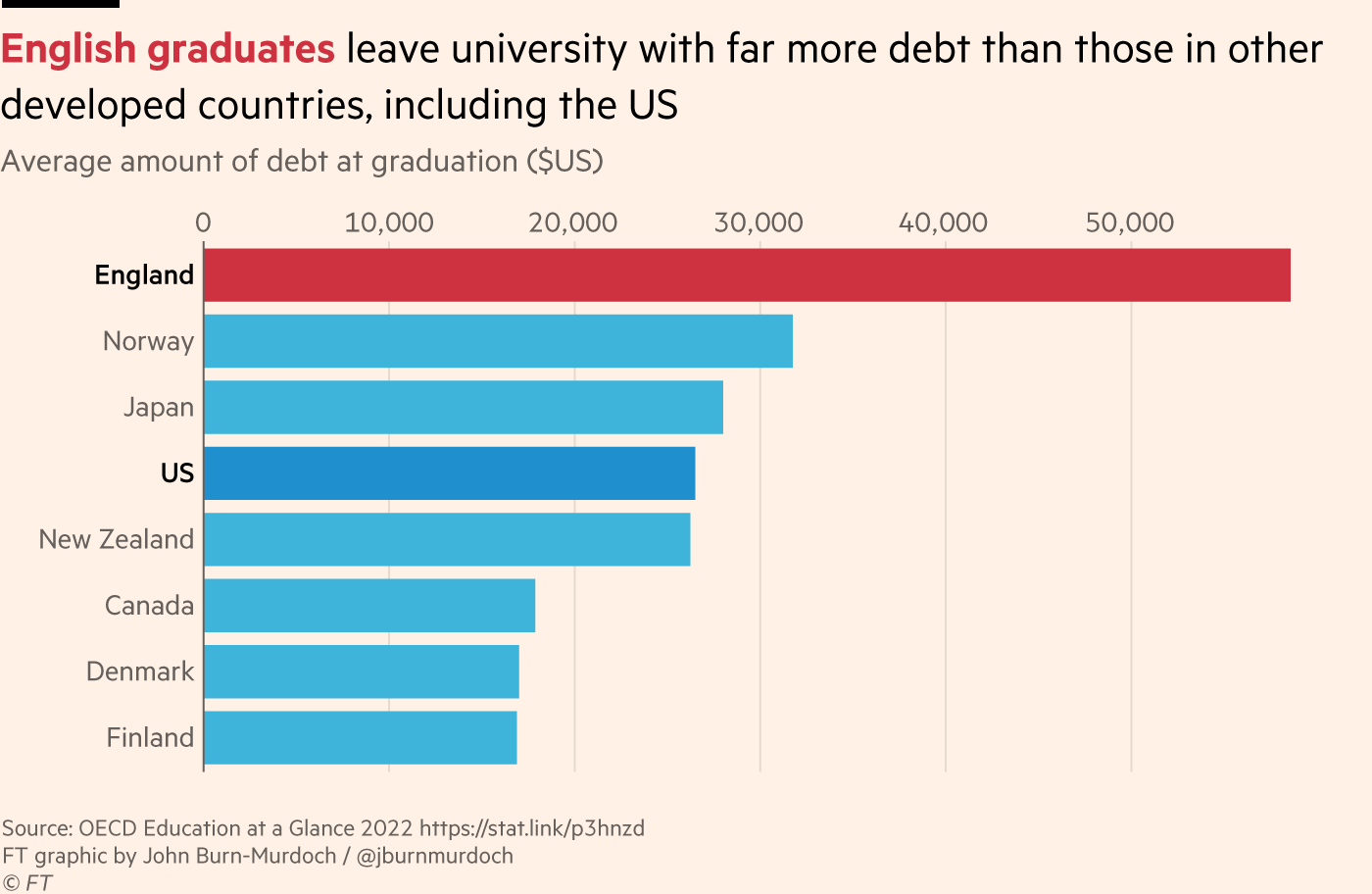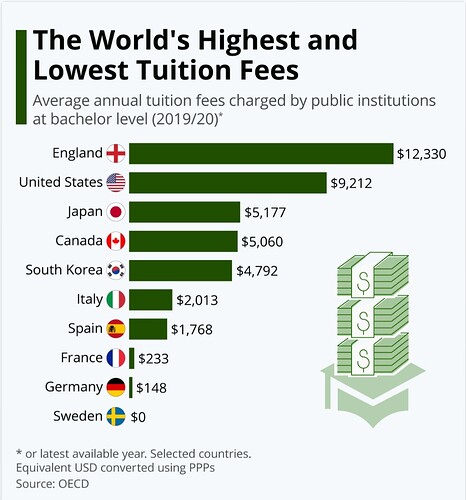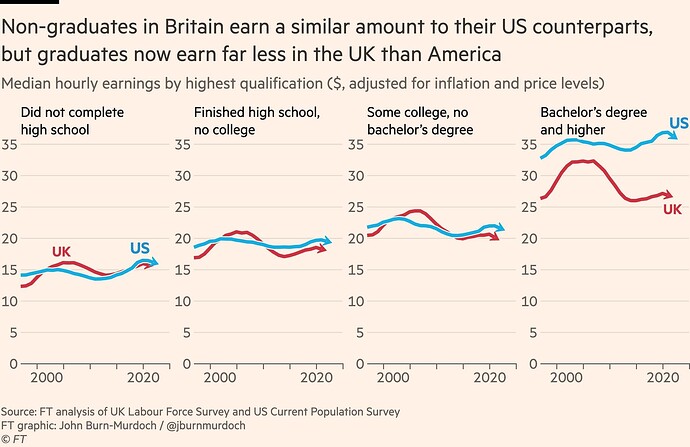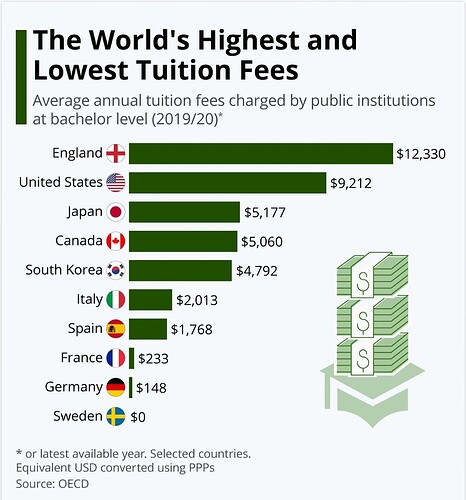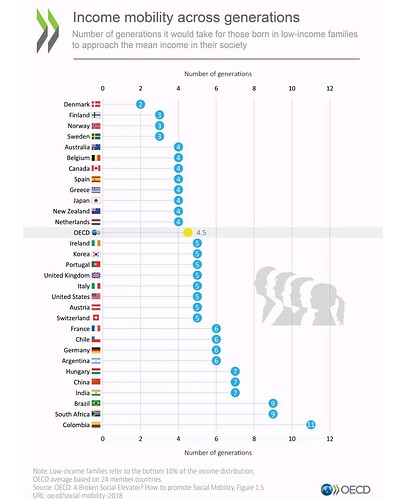Right? Like by the fourth heart surgery that surgeon is gonna be a beast at it
Doctors actually learn that stuff on the job through residency and fellowship. They are getting paid for that, albeit not much.
Is it possible the denominator is (those who graduate with debt)?
Possible, but the US number seems implausibly low if that is the denominator.
I was wondering if there was some other definitional issue. Like in the UK the government pays the tuition… if you work for at least 5 years after graduation (or something similar). Such that it’s technically a loan that is nearly always forgiven. It’s certainly surprising to me if that’s a real apples-to-apples comparison.
I agree with others that there is something not right with these numbers. Is it possible that in the US that English majors primarily attend their state universities rather than go to more expensive ones?
That screenshot is correct.
Its one of the reasons the UK is failing. More and more costs (taxes, education and housing) are being pushed to the young to pay for the old in the UK. This is then having an awful impact on productivity (mental health and general health for younger people has materially worsened).
For the UK, tuition is £9,250 per year not counting maintenance loans (which depend on family income).
Now, this may not sound like a lot to US folks but those tuition loans are tied to RPI + 2% interest rates. So you are paying 6%+ on these things for decades (higher than a mortgage).
So 4 years of loans, with interest being charged on day 1 of the course and you can easily see how you end up with over £50,000 in student debts.
Now, repayments are income based so you pay 9% over an income of £25k/year. You do this for 40 years or until you pay off your loan (less than 50% do as they do not earn enough income).
This is effectively a graduate tax.
So if you are a graduate making £50k/year ($65k/year)
You pay the following marginal tax rate:
40% income tax
2% National Insurance
9% loan charge
All in thats a 51% marginal tax rate which is just awful. It just simply crushes aspiration in the UK.
I didn’t read this as English majors, but graduates from England - English graduates.
You are right. I read it too quickly.
Another thing is that it specifies “graduates”. But in the US the bigger problem is the folks who don’t graduate. They take on a crap ton of debt and party in college for 2.5-3.5 years and then become baristas with nothing to show for their massive and non-dischargeable debt.
At least the folks who graduate have a college degree that they can parlay into at least a median income job. Like I know the places I’ve worked we required college degrees (any degree: theater, gender studies, communication, French poetry, doesn’t matter) for claims analysts. That’s not actuary money but it’s a LOT better than barista money.
The infographic on college debt I posted I sourced from John Burn-Murdoch. He’s the chief data reporter for the Financial Times, so it’s a quality info source. He generally footnotes his materials, and you can access his source excel file using the footnote at the bottom of the page if you really want to get into the weeds. He is also active on twitter should you care to ask him any questions.
A couple of observations:
One thing I learned on Twitter in the subsequent discussion “For the average UK graduate I think you need to adjust for the fact that the recovery rate is significantly lower, because payments are capped at 9% of earnings above 28k.” That’s an important distinction, and would be a big help in the US to those workers drowning in college debt.
There was one person pointing to this data saying the US debt is much higher: Average Student Loan Debt [2024]: by Year, Age & More.
However, that’s average current debt per borrower, not debt at graduation. In this data those aged between 50 to 61 have the highest average student loan debt at $45,600.
Are you talking about me? I feel like you’re talking about me.
Other things different in US vs UK
In the UK the wage bump you get for having a degree is lower than the us:
In the UK the graduate wage premium is falling everywhere but London
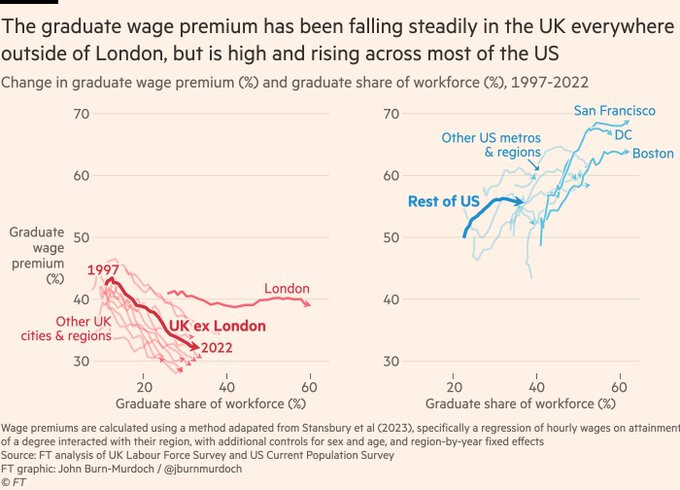
Yes. The US is leaving the UK in the dust economically speaking.
I mentor graduates in my job from time to time and I always tell them that if they have an opportunity to work in the US, they should leave the UK as fast as possible after they have a bit of experience.
There is no real future for them in the UK.
That’s too bad. Thanks for the information though.
I think this graph is a bit misleading at least as far as the US and UK go. It seems to be comparing public institutions, which in the UK is almost every university but in the US would only be the local in-state universities. If you are going out of state or private, I think the US is a lot more expensive than the UK. And the UK would be 3 years of tuition fees, not four. Having said that, there is much more opportunity in the US to qualify for financial aid and scholarships.
I’ve been told that for Germany, the only requirement to qualify for those, low, low fees is that you meet the academic entrance requirements and be able to speak German: you don’t have to be a citizen or even a resident! (Not sure if this has changed recently.)
Thought I would put this here as its relevant.
Access to education is important, but ultimately, the driver of income mobility is family income (parents and grandparents). I don’t see any way of fixing this that does not involve wealth taxes (and these are always highy contentious).
UK is increasingly becoming an inheritocracy, with the US not far behind. Canada seems to be doing better here.
I’m not convinced that is the actual primary driver. There are way too many variables that correlate with income that could contribute to this as well.
